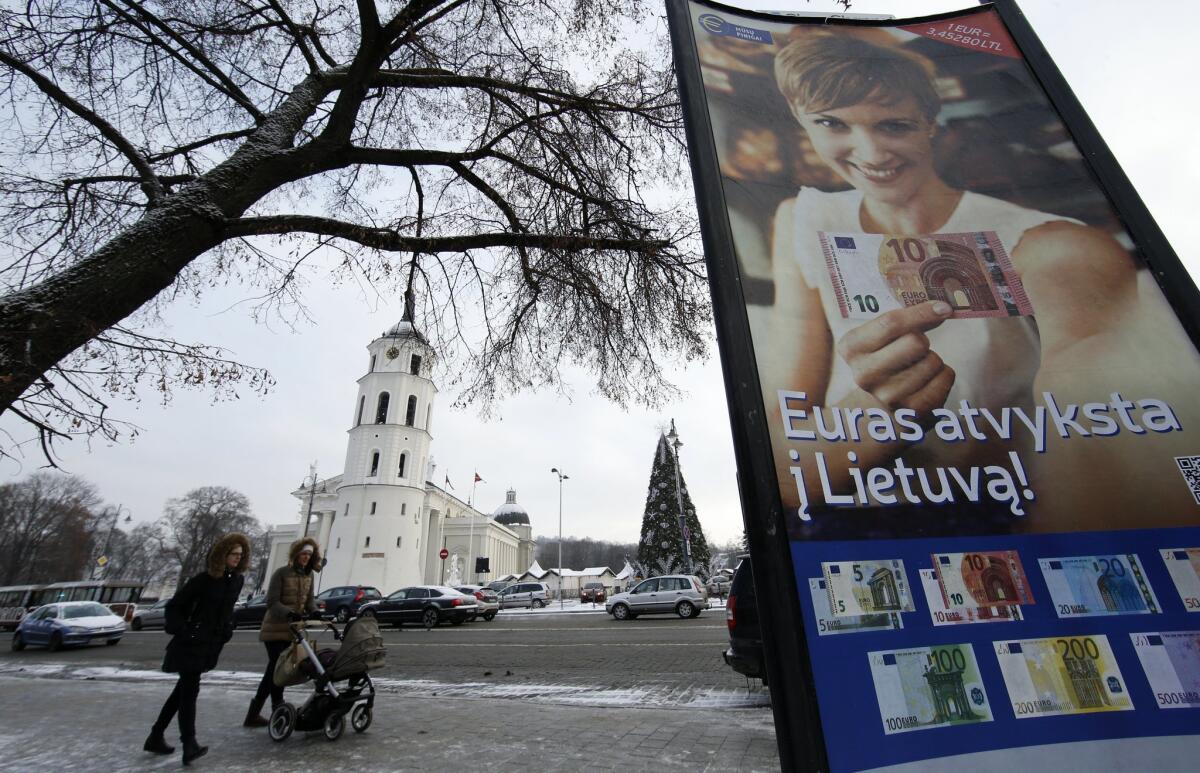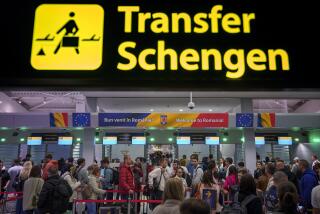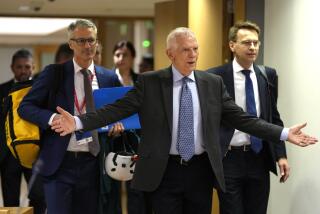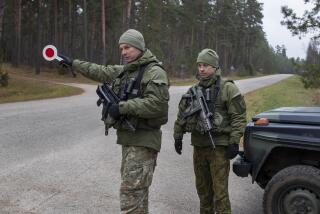Lithuanians embrace Eurozone as shield against threats from Russia

- Share via
Lithuania joined the community of European nations using the euro common currency as New Year’s Day was welcomed in the former Soviet Baltic state, among the smallest and poorest in the 19-member Eurozone.
Only 18 months ago a majority of the country’s 3 million citizens was skeptical of giving up the lita for the euro, to which the national currency has been pegged since 2002.
But a surge in provocative Russian warplane maneuvers and the Kremlin’s aggressive moves in Ukraine this year have driven many Lithuanians to seek what they see as economic protection provided by their European Union allies as well as the strategic defenses acquired with the country’s 2004 induction by NATO.
Much of NATO’s Baltic aerial reconnaissance fleet is based in Lithuania, and the alliance has had to scramble fighter jets to intercept Russian planes violating the national airspace of its member states or conducting clandestine maneuvers in international airspace seen as imperiling civilian aviation.
Officials of the North Atlantic Treaty Organization have reportedly had to deploy jets in response to Russian challenges more than 150 times in 2014, five times the number of incidents the previous year.
Russian President Vladimir Putin has justified his March annexation of Ukraine’s Crimea peninsula with claims that it was part of the Russian Empire a century ago, and he has attempted to cast his support for separatist rebels occupying key areas of eastern Ukraine as protection of Russian-speaking communities and Moscow’s traditional “sphere of influence.”
Lithuanian residents who claim Russian as their primary language account for only 8% of the country’s population, unlike Estonia and Latvia where Russian-speakers make up 30% and 34% of the population, respectively.
A June 2013 survey by the Eurobarometer polling agency found only 41% of Lithuanians in favor of adopting the euro. But in the wake of Moscow’s interventions in Ukraine, that figure had risen to 63% by the time of the firm’s mid-December survey.
The last of the three former Soviet Baltic republics to join the currency union, Lithuania has experience of Russian domination and its leaders have been among the most vocal in warning of the country’s vulnerability to a newly aggressive Kremlin.
Lithuania, Latvia and Estonia were annexed by the Soviet Union under dictator Josef Stalin in 1940 and were occupied and governed by the superpower until it broke up into its 15 constituent republics more than two decades ago. Lithuania was the first to declare independence, setting off the wave of rebellions in January 1991 that ended in the Soviet collapse at the end of that year.
Joining the Eurozone sends a clear message to Moscow that “it is not an alternative to turn away from Europe,” Petras Austrevicius, a Lithuanian member of the European Parliament, told euronews.com on the eve of his country’s switch from the lita to the euro.
Latvia began using the euro on New Year’s Day 2014 and Estonia has been in the Eurozone since 2011. Lithuania applied to join in 2007 but was rebuffed as its economy was deemed in need of further reform to meet Eurozone “convergence criteria.”
Lithuanian economic leaders have been lauding the country’s recovery from the global economic crisis, with a rise in employment and a taming of inflation. They see joining the Eurozone as a likely engine for growth and inducement for lower interest rates. Those advantages have been bolstered by officials’ encouragement of aligning the tiny state more closely with economies of the 28-member European Union to which it has belonged for a decade.
Russia, to which Lithuania sends 20% of its exports, is enmeshed in an economic crisis and on the verge of recession due to economic sanctions imposed by the United States and the European Union, as well as the tumbling price of oil. The Russian government is heavily dependent on energy revenues to fund its budget, and economic officials have warned that the economy could contract by as much as 4.5% in 2015 if per-barrel oil prices stay around the current $60 range.
Follow @cjwilliamslat for the latest international news 24/7
More to Read
Sign up for Essential California
The most important California stories and recommendations in your inbox every morning.
You may occasionally receive promotional content from the Los Angeles Times.











